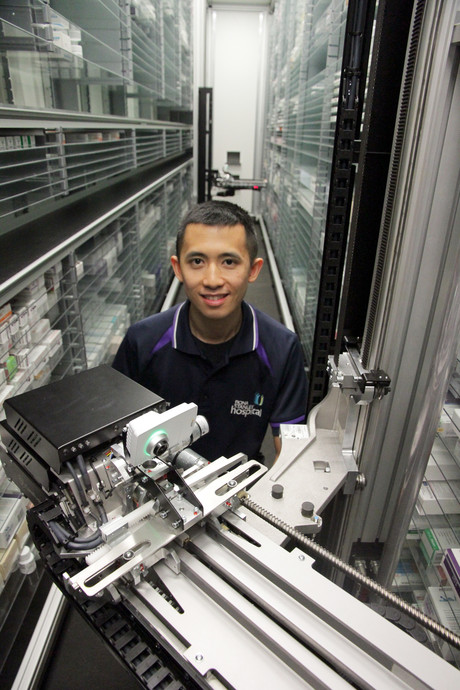Automated pharmacy means more time for patient care

Western Australia’s Fiona Stanley Hospital (FSH) is enhancing the safety, efficiency and governance of its medications across the 783-bed major tertiary hospital through a sophisticated pharmacy automation system.
The automated inventory management system, the largest of its kind in the Southern Hemisphere, supports the hospital’s delivery of comprehensive care services through five key components. These include:
- 3 robotic drug dispensary systems
- 55 automated drug cabinets (ADCs) in clinical areas
- 44 secured anaesthesia drug stations in operating theatres
- 2 electronic controlled drug safes
- 156 medication workstations on wheels.
At the heart of the system are drug dispensary robots that can precisely scan, move and store more than $200,000 worth of medicines each day.
Robotic arms identify and validate medications from suppliers before neatly storing them on shelving units. When orders are received, these robots select the requested medications and prepare them for delivery to the wards.
Barry Jenkins, FSH’s chief pharmacist, said this groundbreaking technology is delivering substantial benefits to the hospital and patients.
“These robots can accurately manage 75% of our pharmacy stock from receipting, storage and tracking of expiration dates in a fraction of the time it used to take us,” he said.
“They have replaced most of the manual tasks associated with drug inventory management and this frees up staff to focus more on patient care.”
The robotic dispensary is linked to secured ADCs located in clinical areas that store imprest medications and electronically tracks their usage and inventory.
As an added security measure, nurses log in to the cabinets using a biometric identifier generated from their fingerprint to access medications.
Medications retrieved from the ADCs are securely stored in patient-specific drawers on the ward’s mobile medication workstations before they are delivered to the patient by the bedside.
When stock levels in an ADC fall below a predefined limit, an automated reorder message is sent to the pharmacy management system which coordinates the selection and resupply medications.
Jenkins said this has led to a 70% reduction in the number of occasions wards had run out of stock.
“Resupply of medication to the wards can now be done in under 10 minutes, which is three times faster than a manual process,” he said.
The system has also added a greater level of security for controlled drugs as these are monitored through an electronic register that records all transactions in accordance with relevant state legislation.
As these medications are used, stock is issued from the pharmacy-controlled drug safe to resupply clinical areas. An electronic governance chain tracks the movement of these medications from pharmacy to clinical areas and automatically flags transactions that require follow-up review.
FSH is the only hospital in the country where every operating theatre and procedural area is equipped with a secured anaesthesia drug station designed to align with the anaesthetists’ workflow. These unique stations provide better access to lifesaving drugs, promote safer drug selection and improve the tracking of controlled drugs.
The use of electronic registers has also eliminated the need to maintain labour-intensive paper registers for imprested controlled drugs in wards and pharmacy areas and reduced the frequency of controlled drug counting.
Using the product’s barcode, detailed data on every transaction is recorded and can be used for auditing and reporting purposes. It also allows the hospital to gain a better understanding of usage trends, review discrepancies and identify areas requiring further optimisation.
FSH’s comprehensive medication management platform delivers real-time efficiency, safety and governance benefits and supports the hospital’s closed loop medicines management vision.
Patients co-design invasive heart surgery monitoring clinical trial
Patients and their families have co-designed a clinical trial to determine if invasive devices...
Have Australian researchers discovered the secret to treating sepsis?
Promising results from a Phase 2 clinical trial have Australian researchers looking to progress...
Could this tailored heart pump transform care for half of heart failure patients?
Half of the 64 million people living with heart failure have no access to heart pump treatments....

![[New Zealand] Transform from Security Awareness to a Security Culture: A Vital Shift for SMB Healthcare — Webinar](https://d1v1e13ebw3o15.cloudfront.net/data/89856/wfmedia_thumb/..jpg)
![[Australia] Transform from Security Awareness to a Security Culture: A Vital Shift for SMB Healthcare — Webinar](https://d1v1e13ebw3o15.cloudfront.net/data/89855/wfmedia_thumb/..jpg)




